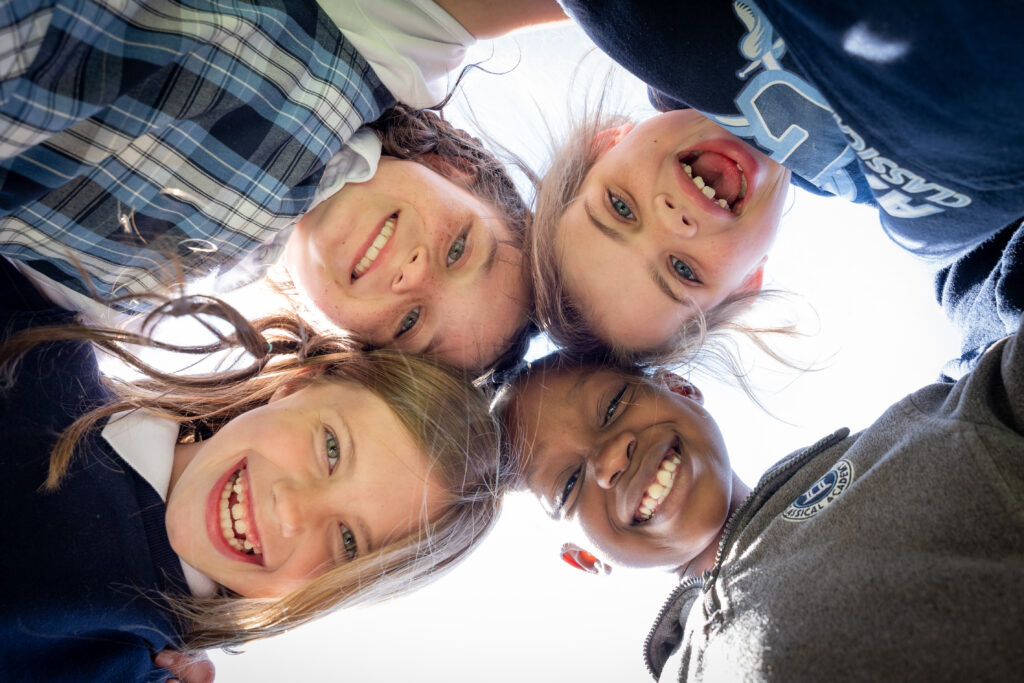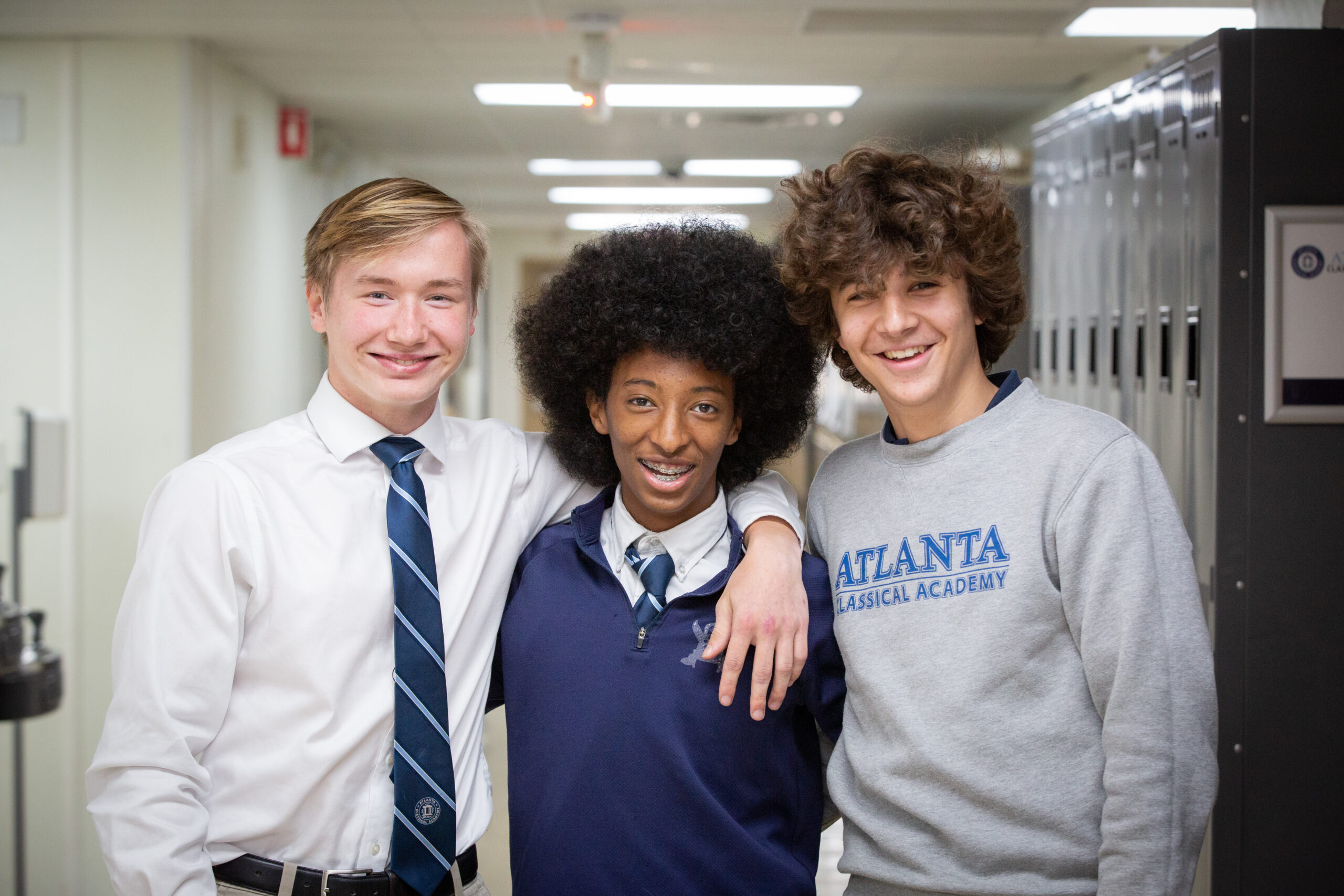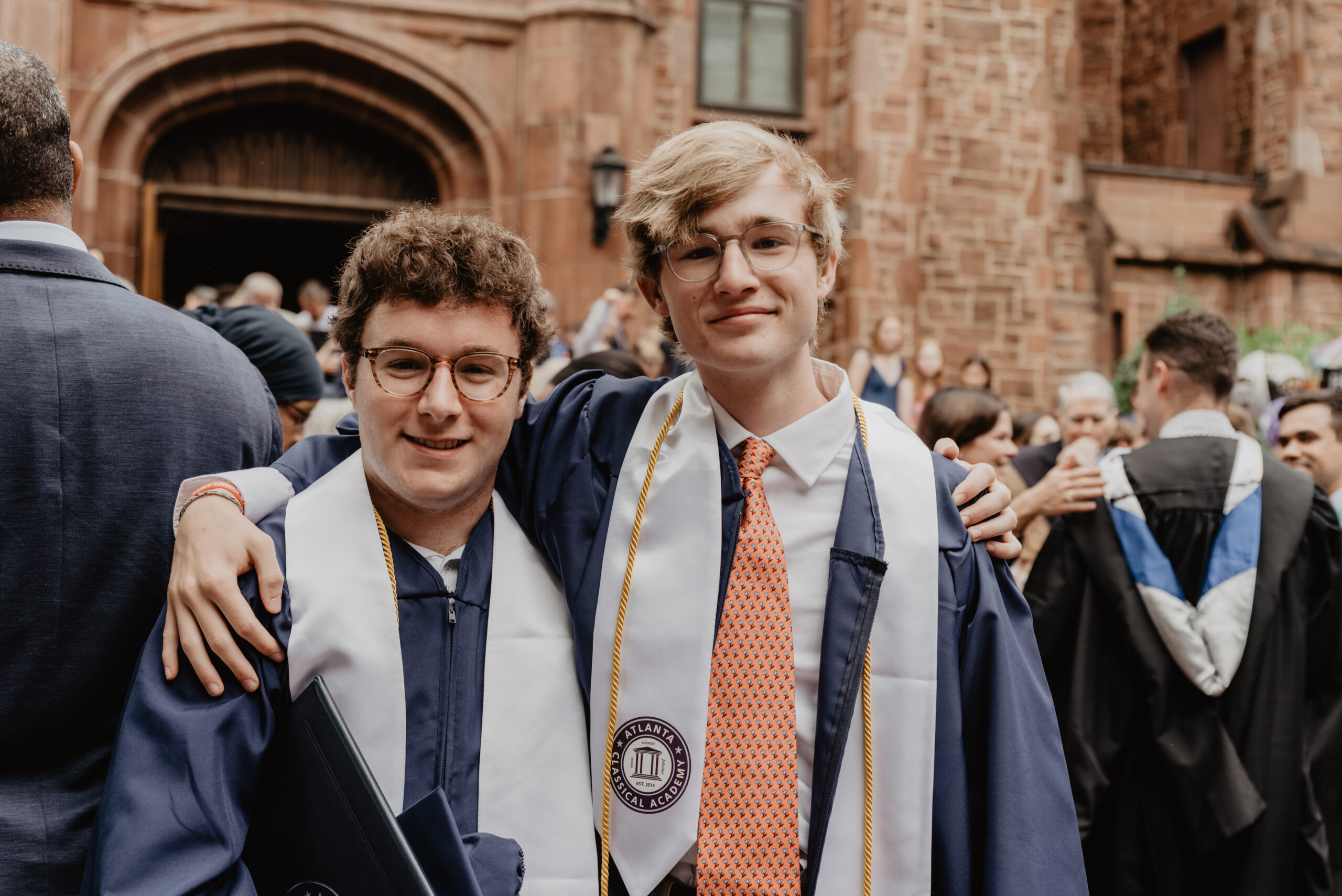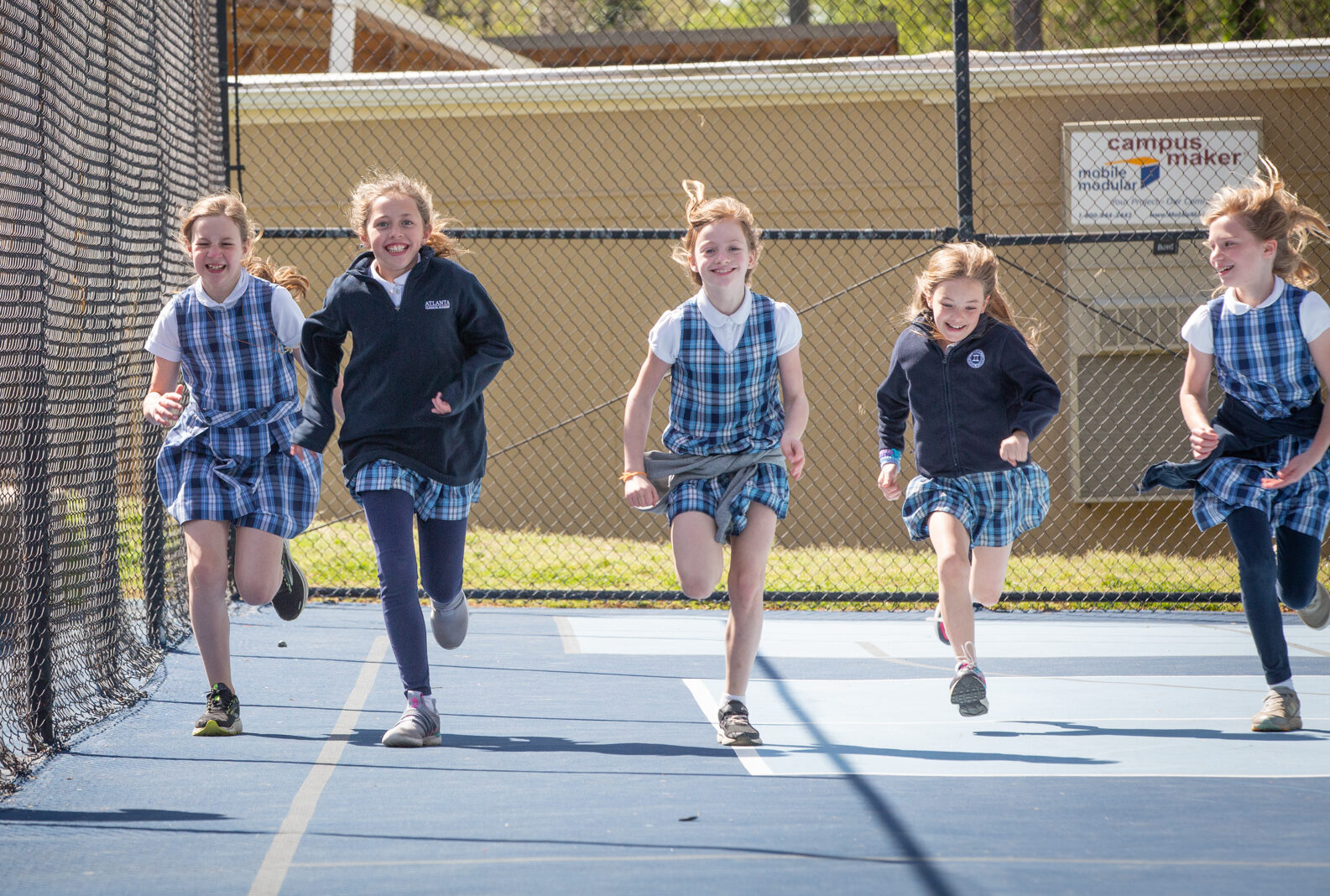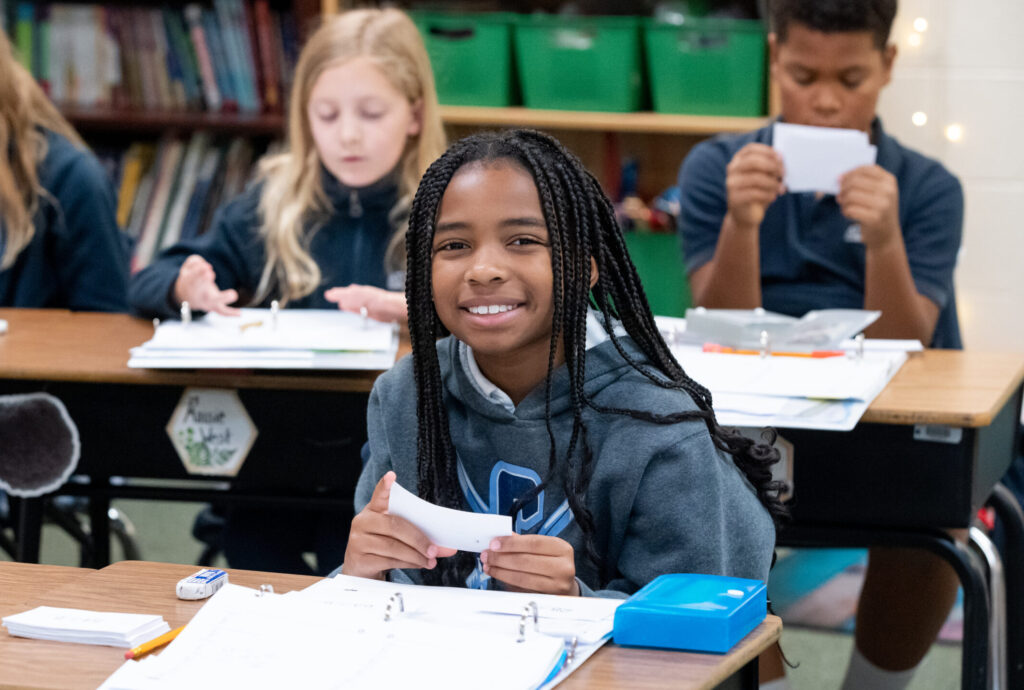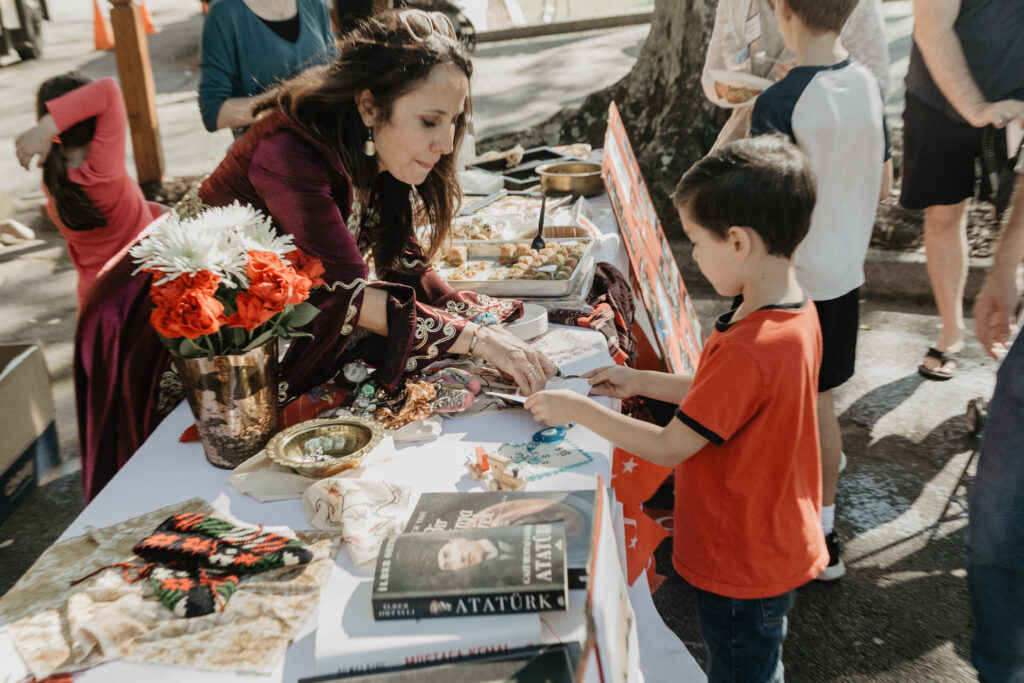Lower School
Classical education aims to not only inform the mind, but also transform the hearts of its students. It is within the confines of a classical education where students learn to be compassionate and understanding through the lessons of a content-rich curriculum and, most importantly, the application of these lessons amongst their peers. This is beautifully described by Atticus Finch in Harper Lee’s To Kill a Mockingbird: “You never really understand a person until you consider things from his point of view . . . until you climb into his skin and walk around in it.”
Curriculum
With a curriculum grounded in the Great Books, we teach from the premise that classic works of literature should be read and discussed for their insights into human nature and how they portray and express that which is timeless and true. At the same time, because understanding the mechanics and structure of language is crucial to a student’s ability to comprehend, we have set aside a separate period for literacy. This allows us to devote undivided attention to the texts in a Literature class.
We believe that literature is one of the main avenues “to develop students in mind and character,” as our mission statement asserts. The rich and vivid depictions of heroism and cowardice, cruelty and mercy, and integrity and dishonesty that our students encounter daily in their books do more to shape their moral imaginations than the repetition of pithy maxims and slogans encouraging good behavior ever could. Each day, students are asked to wrestle with hard questions of morality and virtue, and to see, through a thousand lives they will never live, the consequences of a life of virtue or vice. In Literature, we seek to develop in the students a disposition toward their education in which they believe that the books they read and the ideas they discuss will have a profound impact on the person they are and will become.
In their study of history, our students must learn about people they do not know, places they have never been, and experiences they will never have. It is here that our students must actually stop and consider the plight of others, and the subsequent choices which were made; choices which they, if forced to decide between, might not choose differently. It is during these exercises when students begin to realize the shocking similarities between themselves and a Roman citizen, a factory worker from the Industrial Revolution, or even a soldier from the Civil War. It is here they recognize their humanity, which connects them across time and space to all humans.
In keeping with our school’s mission, we want to ensure that we also form intelligent, not just virtuous, citizens. Using Core Knowledge’s curriculum, students will not only immerse themselves into a wide range of topics, eras, and stories, but also enhance their reading and writing skills along the way.
Students apply the motto they say each morning (“I will learn the true. I will do the good. I will love the beautiful.”) into their studies of science. They learn facts and vocabulary about the human body, plants, electricity, magnetism, cells, chemistry, geology, astronomy, habitats, insects, oceans, classification, light, sound, meteorology, and energy. Additionally, students study scientists including Katherine G. Johnson, Dr. Earnest Just, Dr. Marie Curie, Dr. Charles Drew, Dr. Lewis Latimer, and Dr. Alfred Wegener, who were not only brilliant men and women, but also embodied many of the virtues that form the core of our instruction here at ACA.
Students apply this knowledge through discussions and experiments while developing their understanding of the significance and meaning of the facts they’ve learned. They practice the habits of scientists by distinguishing between facts and theories, making hypotheses, asking questions, drawing conclusions, and carrying out experiments. Examples of these include dissecting beans, flowers, and a pig’s heart; using flashlights to experiment with light and shadow; observing transformations from one form of energy to another; building a lung model; and creating proposals of solutions to natural hazards in the Atlanta area.
Accompanying this learning and activity is the students’ delight in a newly discovered fact or the shouts of surprise and shock at the results of an experiment. Through their study of science, ACA students develop a respect for scientists who have gone before them, and a sense of wonder and love for the beauty of the world in which they live.
Literacy is central to our teaching at Atlanta Classical Academy. We equip our students with the knowledge to become great readers and writers, and we use a systematic phonics program to teach reading through spelling and writing.
Spelling is more than a list to memorize. Our students use a multi-sensory approach to learning their spelling words. They hear a word, say the word, write the word, and read the word all while discussing the rules behind each spelling pattern. In Kindergarten, our students begin learning the sounds of the 72 phonograms and various spelling rules that make up our English language. Each grade progresses with this knowledge as students learn more difficult words. In fourth through sixth grades, students learn the Greek and Latin morphology behind their vocabulary words.
Students write every day. In Kindergarten, students begin writing sentences that are dictated by their teacher and begin writing original sentences by the end of the year. First graders write four-sentence paragraphs, third graders learn to write three paragraphs about a topic, and by the end of fourth grade, students are writing the five-paragraph essay.
Finally, through the learning of phonograms and spelling rules, students are equipped to read great books. Each grade reads four to six books together each year, and our teachers lead enriching and thoughtful discussions of these books during class. We want to fill the minds of our students with rich vocabulary and ideas, and hearing great literature enriches students’ experience of the world.
Atlanta Classical uses the Singapore Math curriculum in our Lower School classrooms. Developed by the Singapore Ministry of Education in the 80’s, Singapore Math is a method for teaching which uses three distinct approaches to understanding mathematical concepts and problem-solving as opposed to just teaching a set of standards. The results are proven: Between 1995 and 2015, Singaporean eighth-grade students ranked 1st in the world 4 times, and never below third. Fourth-grade students ranked 1st in the world 5 times, and never lower than 2nd. The US ranked between 8th and 19th for eighth-grade students and between 6th and 14th for fourth-grade students during that same time period.
The Singapore Math method teaches students to learn and master fewer mathematical concepts in greater detail. These concepts are taught using a concrete-pictorial-abstract process. This allows students at all levels to look at the same mathematical concept in a way that is most helpful to them. Students progress from a concrete understanding (touching/moving manipulatives), to a pictorial representation of the problem, to an abstract representation. When a student struggles, we are able to move back to a concrete or pictorial representation in order to support them.
Singapore Math allows for a higher level of proficiency at a quicker pace, allows for more time for mastery and retention, and prepares students for more advanced math in earlier grade levels. To learn more about Singapore Math, click below:
Barney Charter School Initiative | Video: Why Singapore Math?
Hillsdale College | The Classical Classroom | Why Singapore Math?
The Fine Arts program at Atlanta Classical Academy provides students with an opportunity to explore, develop and be challenged in their pursuit to “learn the true, do the good, and love the beautiful.” Our purpose is to encourage and facilitate a space where students can create beauty in a variety of different media including the visual arts, theatrical arts, musical arts and dance. Students attend art and music class every other day from Kindergarten through 8th grade. Strings are introduced in music class in 3rd Grade. Choir is offered in grades 6-8. Our Lower School curriculum provides students with the opportunity to discover and investigate the arts, leading to a lifetime of appreciation and enjoyment.
Atlanta Classical’s physical education department works to promote the physical, mental, emotional, and social development of every student through a variety of age-appropriate courses and activities. The physical education curriculum works alongside other academic courses to instill school virtues and the importance of discipline. Through their physical education courses, students will learn the importance of health in all areas of life as they grow to become intelligent, virtuous citizens.
Our lower school students participate in instruction designed to develop coordination and motor skills, set examples of healthy competition, and teach sportsmanship and teamwork. Physical Education teachers work to instill enjoyment in students regarding physical activity, laying the groundwork for lifelong healthy habits.

